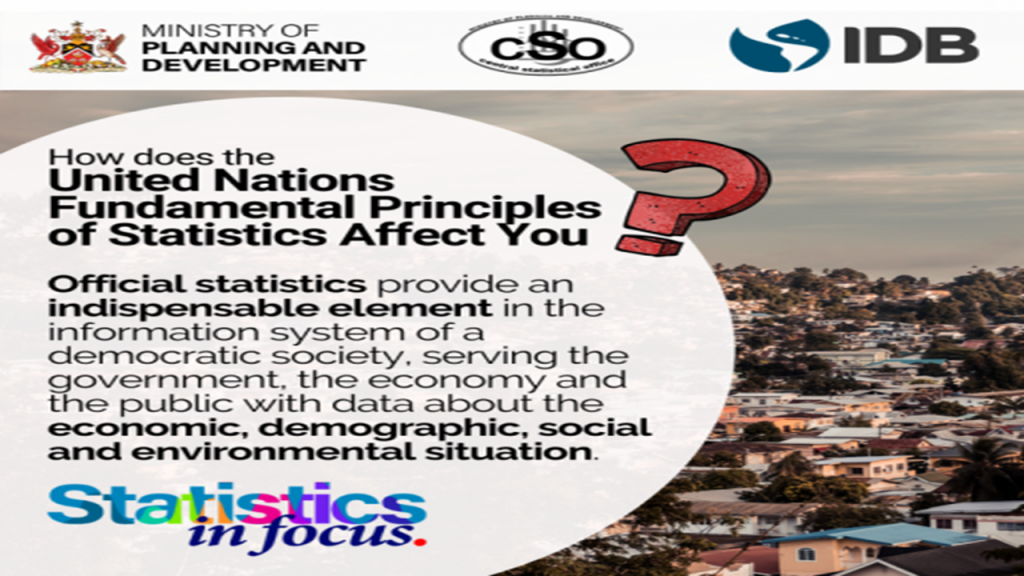“Official statistics provide an indispensable element in the information system of a democratic society, serving the government, the economy and the public with data about the economic, demographic, social and environmental situation. To this end, official statistics that meet the test of practical utility are to be compiled and made available on an impartial basis by official statistical agencies to honor citizens’ entitlement to public information”.
This is Principle 1 of the United Nations Fundamental Principles of Official Statistics highlighting the importance of relevance, impartiality and equal access to official statistics.
Methods of data collection and procedures should be given due impartial assessment along with their restrictions, limitations and alternatives. (Principle 2)
Pursuing objectivity, the third ethical principle, states that all statistical methods and procedures should be presented in a transparent manner. (Principle 3)
Of utmost importance is the preservation of the public’s confidence in official statistics: this can be achieved by accurately describing the results, limitations and reliability of the data collected in a timely fashion while eliminating chances for misuse. (Principle 4)
Data from external sources must be assessed to ensure their quality and relevance. (Principle 5)
Statisticians are charged with protecting the individual rights of subjects by keeping data strictly confidential. (Principle 6)
There must be public access to the laws, regulations, and measures which govern statistical bodies. (Principle 7)
Finally, coordination of standards, concepts and definition as well as cooperation between national and international statistical agencies for efficient and comparable statistical systems is recommended. (Principles 8, 9&10)
Official statistics are the result of those activities undertaken by national statistical offices and other recognized agencies with the mandate to collect and compile and disseminate data as part of the national statistical system. These statistical activities include national censuses, business and agricultural censuses, national accounts, banking, money and international trade statistics.
Official statistics provide trustworthy, invaluable insights into the levels of employment, the incidence of crime, the economy, the health of the population and more. They are a valuable component of any democratic society and can only be used effectively when made freely available to its citizens. The benefits of official statistics to the general public include:
- Providing a clear picture of national development
- Informing public debate with high quality information
- Facilitating improved decision making
- Raising community awareness to empower democratic processes
- Enhancing political accountability and reducing corruption, and
- Preventing the misuse and misinterpretation of statistics
The public’s trust and confidence in the integrity of national statistical systems depend on the values and accountability adhered to by its members. Professional and non-professional users of statistics can benefit from an understanding of the misuse and abuse of statistics. Non-professional users can learn to critically evaluate statistical reports which affect their decision making process for both their personal and public needs.
Statistical misuse and abuse include flaws in the data collection process, personal bias, erroneous calculations, inaccurate interpretations, lack of knowledge, misleading definitions and graphics, faulty data collection design, errors in sample sizes, deliberate suppression of relevant information, and difficulties in verifiability. According to John Pullinger, President of the International Association for Official Statistics, “…false statistics result in poorer decisions and therefore lost lives, weaker economies, less just societies and a future for our children that is not as sustainable as it could have been”.
Official statistics from Trinidad and Tobago’s National Statistical System are necessary for the continuous development of the country, region and the world.
Evidence-based reporting forms the basis of development initiatives of which we are a part, such as the 2030 Agenda for Sustainable Development, international human rights treaties, the Paris Climate Change Agreement and more.
Standard definitions, classifications and methods have been devised by the UN Statistical Department as well as international development partners so designated, which makes it possible to compare data across geographical boundaries. Furthermore, the collaborative efforts of the international statistical community help to bridge gaps in national statistical systems, providing support and training in different areas, allowing accurate measurement of progress or its lack thereof. All aspects of Trinidad and Tobago’s data collection methodology, and analysis must be harmonized with the rest of the world to build statistical capacity and support social, economic and developmental progress.
Author: Central Statistical Office
